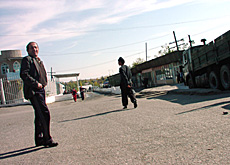
Split by arbitrary borders

Charbog, a village in Fergana Valley divided by the frontier between Uzbekistan and Kyrgyzstan, occupies a strip of land dominated by guards and soldiers.
Supported by the Swiss Agency for Development and Cooperation (SDC), a local aid organisation is working to promote dialogue between the town’s citizens and the guards who watch over them.
Our arrival at the horizontal barrier which serves as the Uzbek customs post seems to cause a good deal of agitation.
“No photographs”, are the first words of the soldiers on duty there. Then they carefully check our visas. Thanks to Swiss involvement, the locals are now spared this procedure.
“It has been agreed that anyone living within 30km of the frontier is no longer required to have a visa”, explains Damira Tukhtasinova, the head of Tarrakiyot, an NGO working in 12 villages in the Pahta-Abad district which have been divided by the frontier.
Relaxing the visa rule has made a huge difference to the lives of the locals. Visas can only be obtained from the different countries’ embassies, in their capital cities, remote from this out-of-the-way little town in the eastern Fergana Valley.
All the local people want to do is walk the short distance to market, now in another country. So they must cross the border, passport in hand.
Meeting the chief
With a few locals going about their business, we walk the 200 metres separating the huts, barriers and armed guards on one side from those on the other.
Between them are a couple of unpaved streets and a few houses. Is this Uzbek or Kyrgyz territory? Not even the inhabitants seem to know. We reach the Kyrgyz customs post, and again are met with bewilderment and irritation. More checks.
On returning to the Uzbek side of Charbog, we find an imposing middle-aged man in camouflage uniform waiting for us: the chief customs officer. He is not persuaded that our visas are valid.
We stay calm (knowing that everything is in order) and hand over our passports once again.
A discussion begins. At a certain point, he thunders: “I’m the one who decides what is legal and what isn’t around here”. Tension rises for a moment. Then, thanks in part no doubt to our diplomatic number plates, everything is settled without further ado.
Abuse of authority?
This episode illustrates some of the difficulties that have arisen in these cross-border areas since independence.
National frontiers suddenly appeared out of the blue, dividing these very simple communities of peasant farmers who had always lived together in peace – and with little interference from the state.
Suddenly, the people of villages like Charbog were faced with a new reality: “omnipotent” border guards. In some cases, the new arrivals abused their real or presumed authority, for example by demanding money to let people through.
“The poorly defined and largely meaningless borders have also given rise to disputes and confusion regarding access to water, electricity supplies and citizenship rights”, adds Damira Tukhtasinova.
Divided society
“Older people realise just how artificial the new situation is, but the young are growing up in a very divided society,” warns the Tarrakiyot representative.
“This is dangerous, particularly if, at some time in the future, they begin to be resentful of other ethnic groups. This could be one result of the restrictions they are forced to put up with.
“We try to damp down the tensions”, continues Damira. “We arrange meetings and seminars, training local mediators and informing citizens and border guards of their rights – of which they are often in total ignorance.”
Ambassadors
Since last September, the SDC has been providing financial support for Tarrakiyot’s activities.
This is part of a Regional Dialogue and Development (RDD) project launched in 1999 to help bring stability to the region. One aspect of the project is the creation of a network of “ambassadors” to promote friendship.
The network consists of local VIPs (scientists, doctors, journalists and politicians), people who are known and respected, and who can negotiate with the local and national authorities to work out solutions to cross-border problems.
“Mind you, frontiers are not an unmitigated evil. For example, they are useful for monitoring and combating religious fundamentalism or drug trafficking,” says Tulkun Bekmuratov, leader of the Uzbek team of ambassadors.
“But one day the frontiers will be open again”, he concludes with a smile. “You can be sure of that.”
swissinfo, Marzio Pescia, Jean-Didier Revoin, Charbog
The new frontiers have caused problems in four main areas:
The free circulation of people and goods;
Joint use of land and water resources split by the borders;
Access to schools and other facilities;
Citizenship rights.
The Tarrakiyot NGO is seeking to encourage dialogue in cross-border communities in Pahta-Abad district, in the eastern part of the Fergana Valley, Uzbekistan.
Its work is focused on an area covering 12 villages that have been divided by the frontier (affecting some 12,000 inhabitants).
Tarrakiyot gets financial backing from the Swiss Agency for Development and Cooperation.
Switzerland spends a total of SFr4 million per year on regional development and dialogue projects in the Fergana Valley.

In compliance with the JTI standards
More: SWI swissinfo.ch certified by the Journalism Trust Initiative































You can find an overview of ongoing debates with our journalists here . Please join us!
If you want to start a conversation about a topic raised in this article or want to report factual errors, email us at english@swissinfo.ch.